
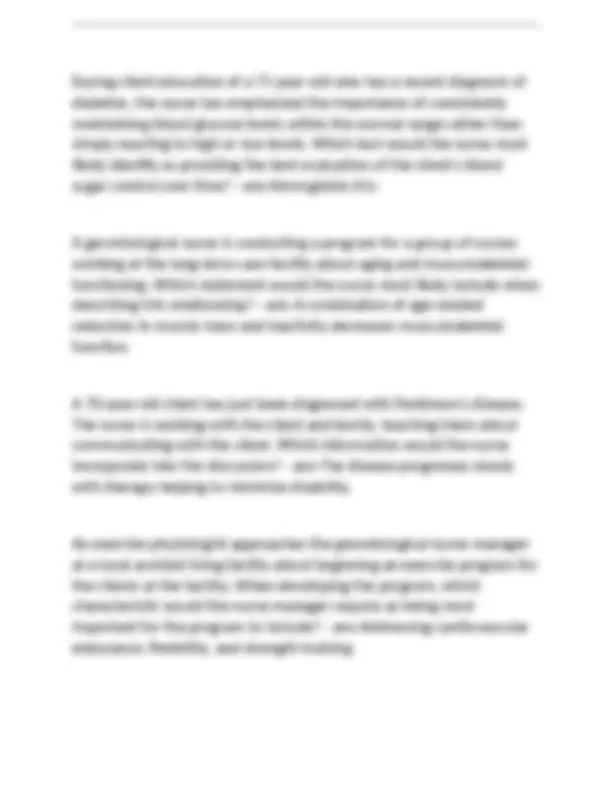
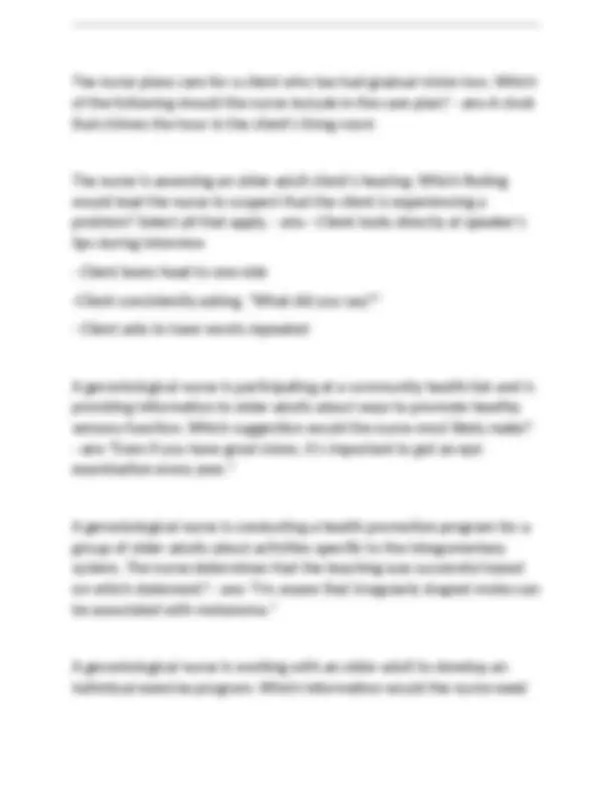
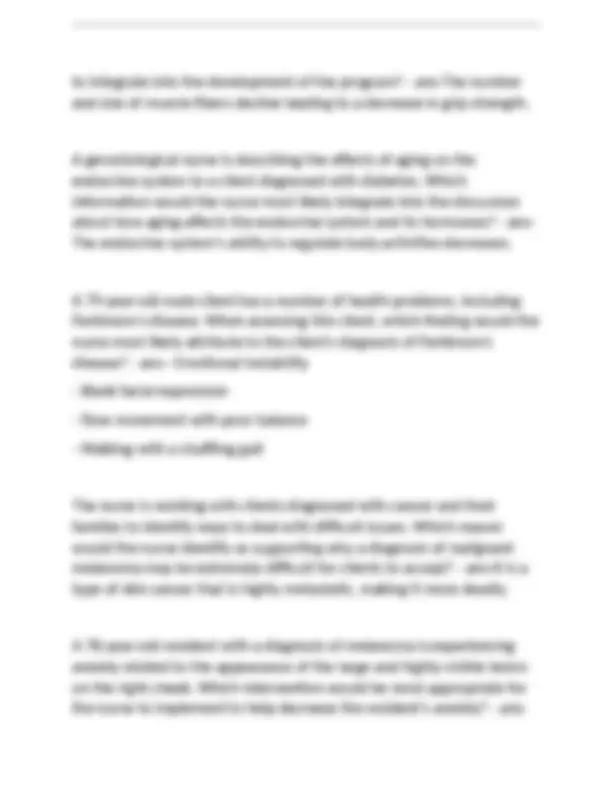
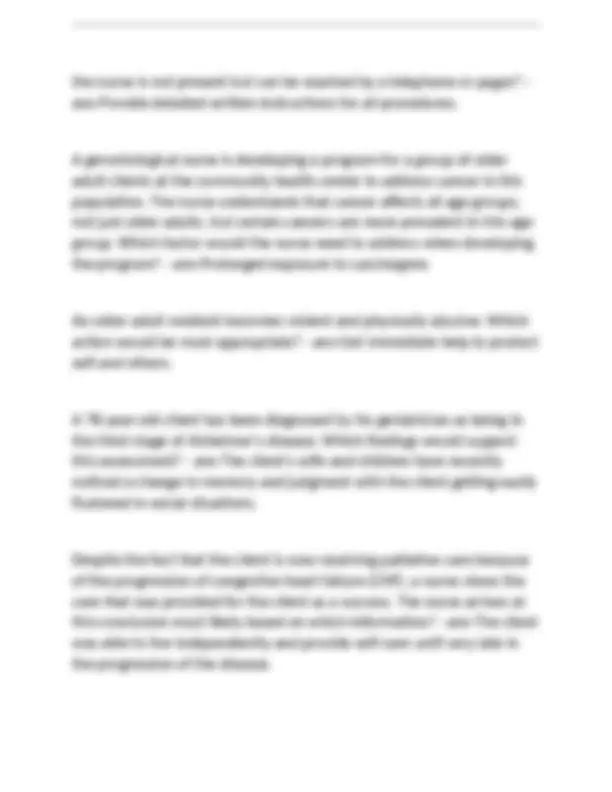
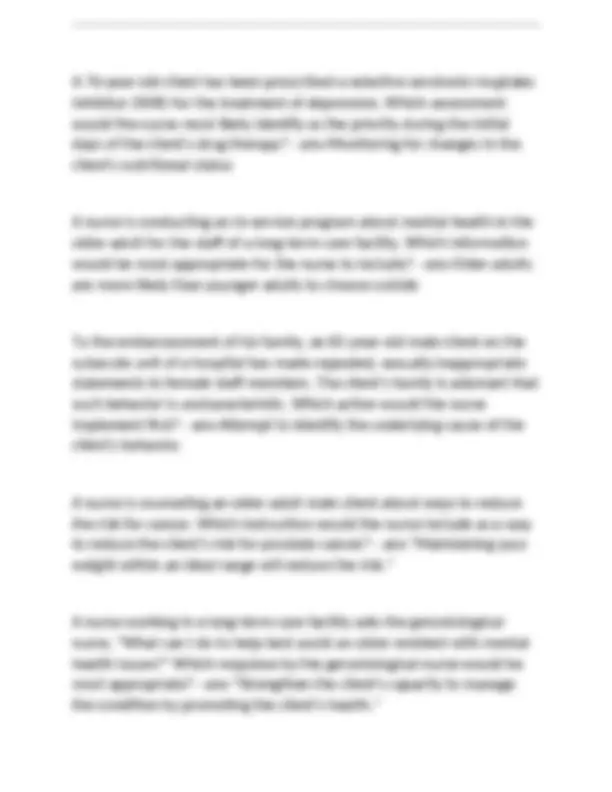
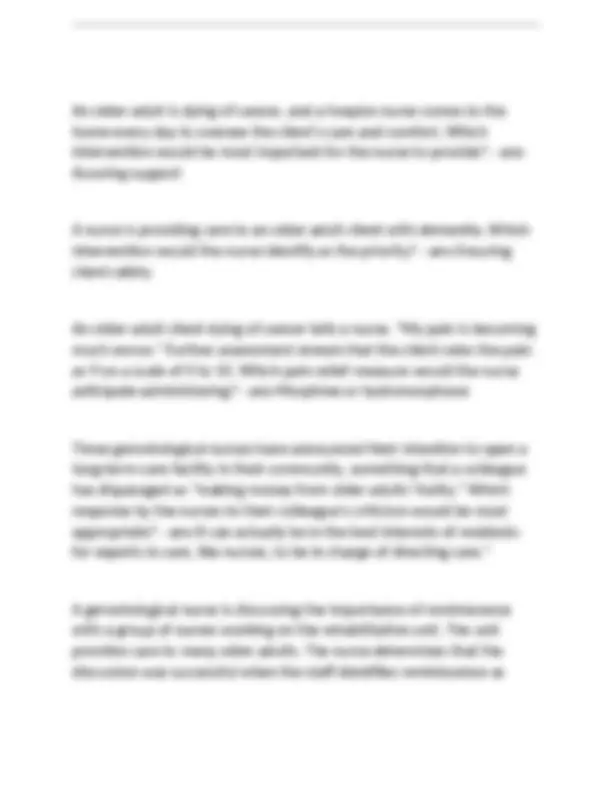
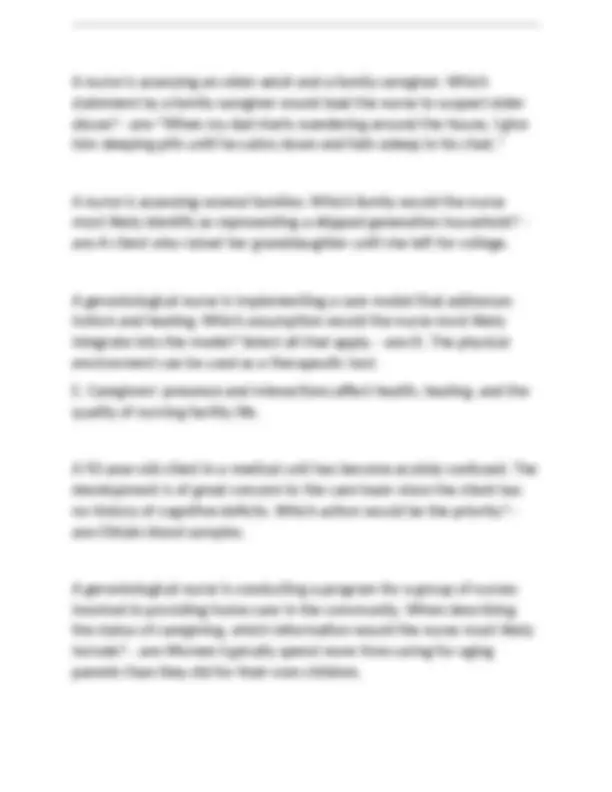
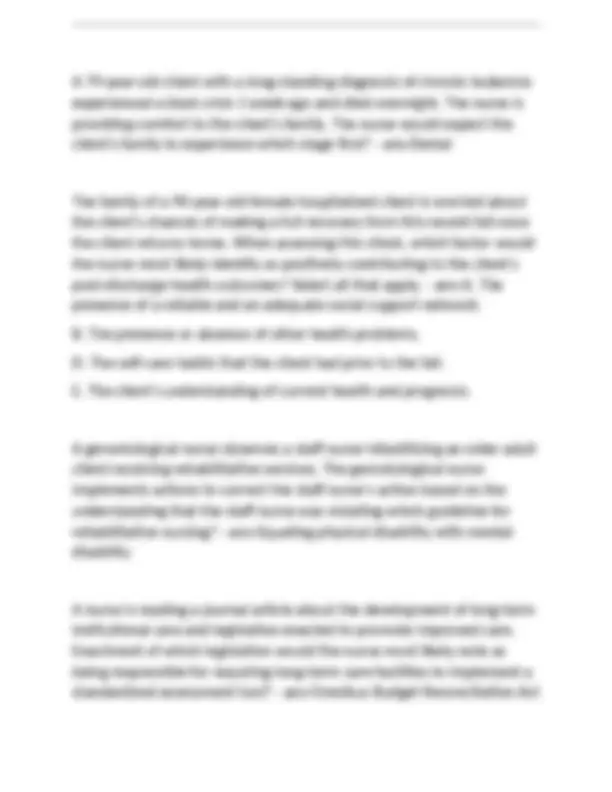
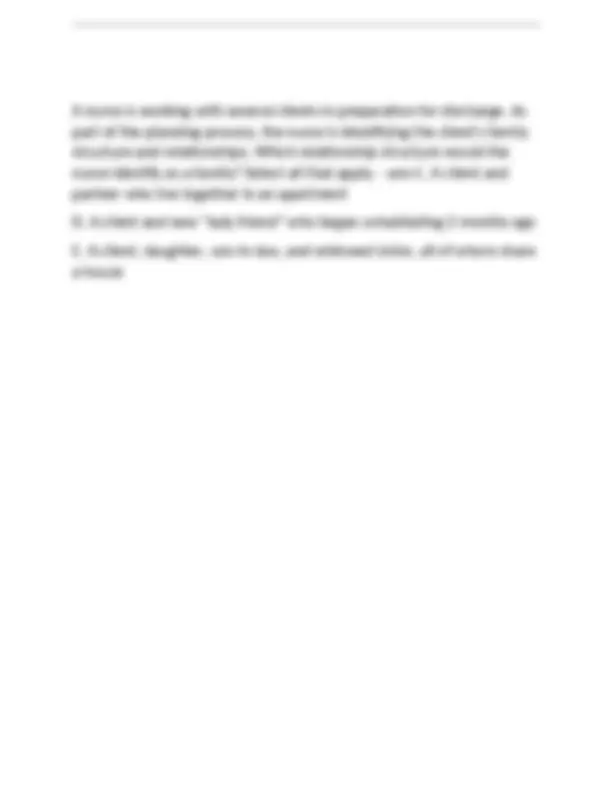


Study with the several resources on Docsity

Earn points by helping other students or get them with a premium plan


Prepare for your exams
Study with the several resources on Docsity

Earn points to download
Earn points by helping other students or get them with a premium plan
Community
Ask the community for help and clear up your study doubts
Discover the best universities in your country according to Docsity users
Free resources
Download our free guides on studying techniques, anxiety management strategies, and thesis advice from Docsity tutors
Solution to Gerontological Nursing Final Exam.docx
Typology: Exams
1 / 15

This page cannot be seen from the preview
Don't miss anything!










A client newly diagnosed with diabetes tells the nurse, "I'm fearful and nervous about having to cope with this disease." Which response by the nurse would be most appropriate? - ans-"It's true that you will have to make some changes but these changes will help control your diabetes." A nurse is conducting an educational program for a client newly diagnosed with type 2 diabetes. The nurse determines that the teaching has been successful based on which outcome? Select all that apply. - ans--Demonstration of the correct method of blood glucose testing -Demonstration of the proper technique for medication administration -Verbalization of understanding of diabetes and its management A 75-year-old adult is a new attendee at strength training class. Which schedule would be most appropriate for this client to engage in? - ans- Twelve repetitions with low-weight free weights at least twice weekly.
The nurse is presenting a seminar for older adults experiencing integumentary problems. Which statement would the nurse most likely provide about the use of alternative therapies? - ans-"You need to tell your health care provider about alternative therapies in use." A nurse is reviewing the plan of care for a 78-year-old resident of a long-term care facility diagnosed with Parkinson's disease. Which intervention would need to be modified? - ans-Phrase questions and directions in a simple and understandable manner applicable to the client's decreased cognition. A client is prescribed Larodopa as part of the treatment plan for Parkinson's disease. When teaching the client about this drug, which item would the nurse encourage the client to avoid? - ans-Foods high in vitamin B 6 A gerontological nurse is conducting a program for staff nurses at a long-term care facility about older adults and sensory function. When discussing this topic, which information would the nurse most likely include? Select all that apply. - ans-- "Sensory deficits are a threat not only to quality of life but to safety as well."
The nurse plans care for a client who has had gradual vision loss. Which of the following should the nurse include in the care plan? - ans-A clock that chimes the hour in the client's living room The nurse is assessing an older adult client's hearing. Which finding would lead the nurse to suspect that the client is experiencing a problem? Select all that apply. - ans-- Client looks directly at speaker's lips during interview
to integrate into the development of the program? - ans-The number and size of muscle fibers decline leading to a decrease in grip strength. A gerontological nurse is describing the effects of aging on the endocrine system to a client diagnosed with diabetes. Which information would the nurse most likely integrate into the discussion about how aging affects the endocrine system and its hormones? - ans- The endocrine system's ability to regulate body activities decreases. A 79-year-old male client has a number of health problems, including Parkinson's disease. When assessing this client, which finding would the nurse most likely attribute to the client's diagnosis of Parkinson's disease? - ans-- Emotional instability
A nurse planning a health workshop for senior citizens wants to provide discussion topics that will interest everyone. In a typical group of seniors, which disorder would the nurse most likely identify as affecting the greatest number? - ans-Arthritis A nurse is assessing several older adult clients. The nurse determines that which client is experiencing a health problem characterized as delirium rather than dementia? - ans-An older adult male whose wife has brought him to the emergency department because of forgetfulness and confusion exhibited over the last 48 hours. A 72-year-old client just recently diagnosed with cancer comes to the clinic for an evaluation. During the visit, the client asks the nurse, "I know that there are different things that can be done to treat cancer, but I'm wondering if my age might affect what can be done?" Which information would the nurse most likely integrate into the response to the client? - ans-Reduced dosages of chemotherapeutic agents will be necessary due to age-related changes in kidney function. A nurse is providing care to an older adult client with dementia. When reviewing the client's history, which condition would the nurse suspect as the most likely cause? - ans-Genetic predisposition A home health care nurse is providing care to an older adult client with chronic conditions. Which intervention would be most appropriate for the nurse to implement to best ensure proper care for a client when
the nurse is not present but can be reached by a telephone or pager? - ans-Provide detailed written instructions for all procedures. A gerontological nurse is developing a program for a group of older adult clients at the community health center to address cancer in this population. The nurse understands that cancer affects all age groups, not just older adults, but certain cancers are more prevalent in this age group. Which factor would the nurse need to address when developing the program? - ans-Prolonged exposure to carcinogens An older adult resident becomes violent and physically abusive. Which action would be most appropriate? - ans-Get immediate help to protect self and others. A 78-year-old client has been diagnosed by his geriatrician as being in the third stage of Alzheimer's disease. Which findings would support this assessment? - ans-The client's wife and children have recently noticed a change in memory and judgment with the client getting easily flustered in social situations. Despite the fact that the client is now receiving palliative care because of the progression of congestive heart failure (CHF), a nurse views the care that was provided for the client as a success. The nurse arrives at this conclusion most likely based on which information? - ans-The client was able to live independently and provide self-care until very late in the progression of the disease.
An older adult is dying of cancer, and a hospice nurse comes to the home every day to oversee the client's care and comfort. Which intervention would be most important for the nurse to provide? - ans- Assuring support A nurse is providing care to an older adult client with dementia. Which intervention would the nurse identify as the priority? - ans-Ensuring client safety An older adult client dying of cancer tells a nurse, "My pain is becoming much worse." Further assessment reveals that the client rates the pain as 9 on a scale of 0 to 10. Which pain relief measure would the nurse anticipate administering? - ans-Morphine or hydromorphone Three gerontological nurses have announced their intention to open a long-term care facility in their community, something that a colleague has disparaged as "making money from older adults' frailty." Which response by the nurses to their colleague's criticism would be most appropriate? - ans-It can actually be in the best interests of residents for experts in care, like nurses, to be in charge of directing care." A gerontological nurse is discussing the importance of reminiscence with a group of nurses working on the rehabilitative unit. The unit provides care to many older adults. The nurse determines that the discussion was successful when the staff identifies reminiscence as
having which effect? Select all that apply. - ans-B. Means of finding meaning in remaining life D. Memory improvement E. Means for resolving past conflicts Upon further questioning, an older adult client who expressed apprehension about upcoming coronary artery bypass surgery admitted, "I had a had a friend who had coronary artery bypass surgery a few years ago and had many complications after the surgery." Which response by the nurse would be most appropriate? - ans-"Bypass surgery has improved over the past 20 years." A client is beginning to awaken after surgery and becomes extremely restless. Which agent would the post-anesthesia care nurse most likely administer first? - ans-Oxygen to correct hypoxia A nurse is providing care to four clients with terminal cancer who are on the unit. While on rounds, the nurse assesses each client and determines that which client may be near death? - ans-Client who has a rapid, weak pulse. A nursing home resident who is bitter about placement in the nursing home by the family, says, "My family doesn't love me." Which situation would the nurse most likely identify as the reason for placement if the client's family fits the typical picture? - ans-A crisis made it necessary.
A nurse is assessing an older adult and a family caregiver. Which statement by a family caregiver would lead the nurse to suspect elder abuse? - ans-"When my dad starts wandering around the house, I give him sleeping pills until he calms down and falls asleep in his chair." A nurse is assessing several families. Which family would the nurse most likely identify as representing a skipped-generation household? - ans-A client who raised her granddaughter until she left for college. A gerontological nurse is implementing a care model that addresses holism and healing. Which assumption would the nurse most likely integrate into the model? Select all that apply. - ans-D. The physical environment can be used as a therapeutic tool. E. Caregivers' presence and interactions affect health, healing, and the quality of nursing facility life. A 92-year-old client in a medical unit has become acutely confused. The development is of great concern to the care team since the client has no history of cognitive deficits. Which action would be the priority? - ans-Obtain blood samples. A gerontological nurse is conducting a program for a group of nurses involved in providing home care in the community. When describing the status of caregiving, which information would the nurse most likely include? - ans-Women typically spend more time caring for aging parents than they did for their own children.
A 79-year-old client with a long-standing diagnosis of chronic leukemia experienced a blast crisis 1 week ago and died overnight. The nurse is providing comfort to the client's family. The nurse would expect the client's family to experience which stage first? - ans-Denial The family of a 90-year-old female hospitalized client is worried about the client's chances of making a full recovery from this recent fall once the client returns home. When assessing this client, which factor would the nurse most likely identify as positively contributing to the client's post-discharge health outcomes? Select all that apply. - ans-A. The presence of a reliable and an adequate social support network. B. The presence or absence of other health problems. D. The self-care habits that the client had prior to the fall. E. The client's understanding of current health and prognosis. A gerontological nurse observes a staff nurse infantilizing an older adult client receiving rehabilitative services. The gerontological nurse implements actions to correct the staff nurse's action based on the understanding that the staff nurse was violating which guideline for rehabilitative nursing? - ans-Equating physical disability with mental disability A nurse is reading a journal article about the development of long-term institutional care and legislation enacted to promote improved care. Enactment of which legislation would the nurse most likely note as being responsible for requiring long-term care facilities to implement a standardized assessment tool? - ans-Omnibus Budget Reconciliation Act